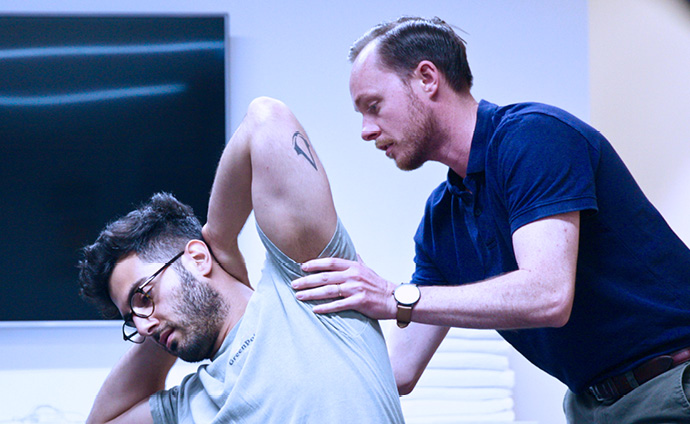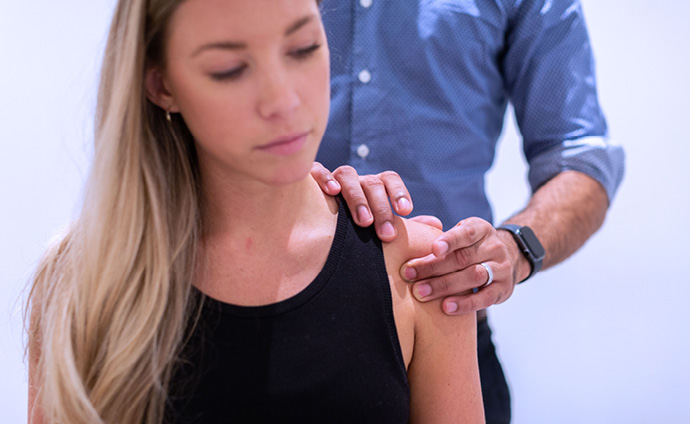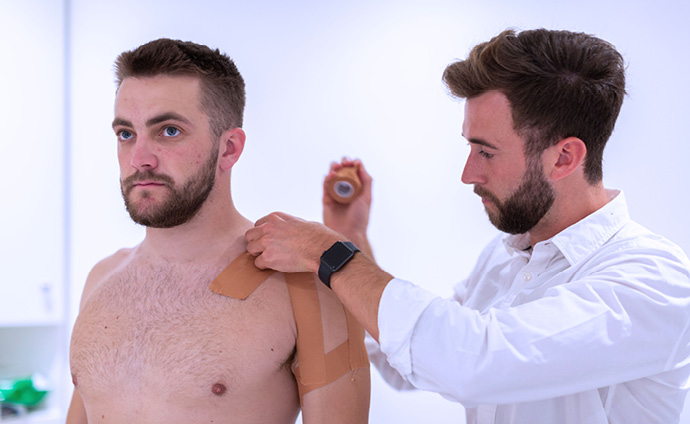With rugby season ramping up, we’re seeing an increase in shoulder muscle tears and dislocations. As physiotherapists, we always want to help our clients get back to full health as quickly as possible through the variety of treatments we can offer. However, there are some instances where physio may not be the best or only treatment required on your road to recovery.
At Spectrum, we generally try to make sure we exhaust all non-invasive treatment options before considering surgery, but we’re always open to the advice of the London surgeons we have built strong relationships with to ensure we ultimately get the best result for you.
As Spectrum’s physio, Ant Brightwell explains, there are slightly different classifications of a dislocation.
“You’ve got a mini dislocation where the joint doesn’t come out completely — that’s called a subluxation — then there’s a dislocation itself. The prognosis of full recovery differs depending on whether your shoulder joint has partially or completely come out of the socket. Often if it comes out completely, the general assumption is that there’s been some structural damage, whether it’s been a ligament tear, a labrum tear or some other sort of muscle tear. That can even be the case when it pops back in by itself, and often there can be a bone break or fracture to go along with it.”

What is also interesting is that often the decision whether to go with surgery or not is less related to how severe the dislocation is and more likely determined by how it happened.
Ant explains that some instances of shoulder dislocation are due to trauma, whether that be a rugby player who goes into a tackle with their arm stretched out and the opposing player hits the arm in an awkward position, a car accident or falling off your bike.
Trauma dislocations are related to the amount of force that’s gone through the structures in your shoulder that it hasn’t been able to tolerate because the joint has been forced past its normal range of movement. When this happens, structural damage is caused that will need to be repaired through rehab to re-stabilise the shoulder, regardless of whether you have surgery or not. Unless a similar force happens again before this re-stablilsation process has happened, for example if you return to sport too early, then you shouldn’t experience any long term shoulder problems.
A thorough assessment to determine how much structural damage there is will normally be done in conjunction with the opinion of a surgeon and the main question that needs to be answered is whether the damage is extreme enough that the patient needs surgery, or whether the damage is minor enough that even if the injury doesn’t heal 100%, will they be able to function properly again without the need for surgery.

If a trauma event wasn’t the cause of your shoulder dislocation, it could come down to genetics, which is where surgery sometimes becomes a more likely option, even for less severe structural damage.
“I’ve actually got a patient at the moment that dislocated his shoulder doing something simple at the gym, it was really unexpected. There was no big movement and his arm wasn’t stretched out or in an awkward position, he was just tired and it popped out of its own accord.” explains Ant.
“When I assessed him I found that he has what we would classify as hypermobility, meaning a lot of his joints stretch more than the average person’s, so he’s more at risk of dislocations and more susceptible to joint limitation issues.
“While there didn’t seem to be too much structural damage and the surgeon seemed to think physio alone would be able to repair it, eight weeks into rehab the patient moved house, lifted up a box and his shoulder popped out again. Now, that little bit of damage is the difference between his ability to make a full recovery versus this continuing to happen, so consequently he’s now going to be operated on.”
For people who have hyper mobile joints (or are just really bendy people, as Ant puts it!) the question is always whether they can manage their shoulder by simply training the muscles to hold the shoulder in place tighter or whether they would rather intervene with surgery to literally go in and stiffen the shoulder up for them.

“The reason why we don’t just jump to shoulder surgery straight away is because it’s a very intrusive surgery with common complications, including people ending up with stiffness and other issues. Also it’s a lengthy rehab! Even in the best case scenario you’re looking at six months of rehab, maybe more. It’s a big commitment, so a lot of the time, patients will opt for trying physio first without surgery,” says Ant.
Whether you go down the surgery route or not, what Ant will be looking for in terms of early signs of recovery during rehab will be the same.
“Basically we’re concerned with making sure the shoulder doesn’t stiffen up. Mechanically speaking, the shoulder often responds to both the trauma of a dislocation or a surgery by stiffening up, so this is what a doctor will be monitoring too.
“One of my shoulder dislocation patients chose not to go down the surgery path because it was a one-off car accident that caused it, yet the doctor wasn’t happy with how much his shoulder had stiffened up. He’d been protecting it and didn’t want to move it because it was too painful, so by the time I tried to move it I wasn’t able to.
“The surgeon gave him an injection to try and free it up, and then it was back to me to regain full movement. From there, when he’s got normal movement again, we will be able to make a final call as to whether he has too much movement and instability and may still need surgery later down the track.”
So, to surgery or not to surgery? Ultimately it will come down to two main things. One, whether the structural damage is so severe that it is unlikely you will regain functionality without surgery, and two, whether the genetic makeup of your shoulder will allow you to regain stabilisation after a dislocation without extreme intervention via surgery. And neither of those questions can be answered without a thorough assessment by a physio… which is where we come in!
Do you need a shoulder assessment? Book a time to see one of our fully qualified physios via our website today.



